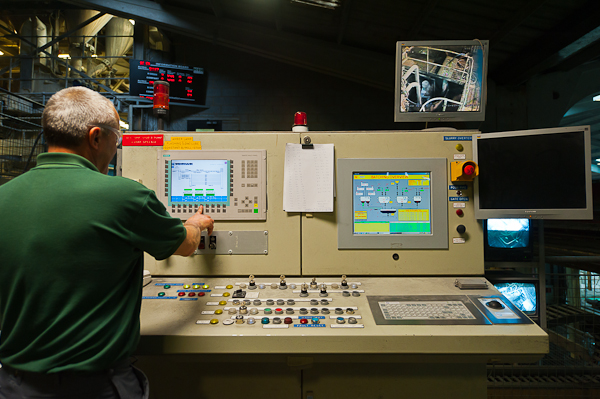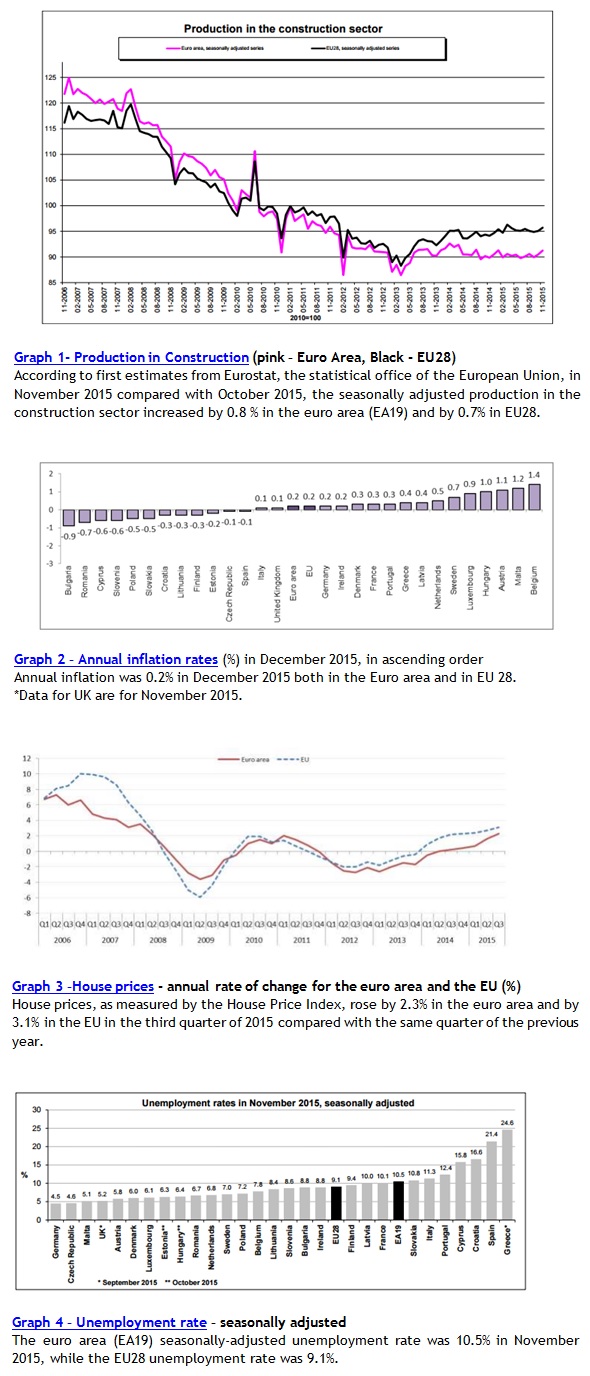Concrete Perspectives January 2016
Construction sector
- On 11 January 2016, the Building Research Establishment Environmental Assessment Methodology (BREEAM) made available a briefing paper entitled “Strategic approach to the selection and procurement of construction materials and products”. The paper clarifies how BREEAM seeks to encourage the whole building consideration of materials through the use of robust and science based approaches during the design and procurement of buildings, infrastructure and others aspects of the built environment. Furthermore, it also explains how BREEAM aims to promote the take-up and harmonisation of standards and methodologies.
- On 18 January 2016, the European Construction Industry Federation (FIEC) published a position paper on the Circular Economy Action Plan. The key points are :
- FIEC welcomes the fact that the revised legislative proposals on waste will clarify existing rules on “end-of-waste”;
- FIEC welcomes measures to improve, evaluate and acknowledge the quality of secondary raw materials. However the federation wants the standards for conformity assessment of secondary raw materials to be harmonised. If possible, the same standardised methods should be referred to in all relevant legislation, to avoid any overlapping and even contradictory testing;
- FIEC emphasises that the Construction Products Regulation (CPR) and European standardisation already deal with most relevant characteristics of construction products, including their environmental and wider sustainability properties;
- FIEC accepts the principle that landfilling should be progressively restricted, but stresses that there must be viable alternative means available, to dispose of genuine waste;
- FIEC strongly agrees that an unambiguous definition of Construction and Demolition Waste is needed;
- FIEC strongly agrees that Member States should promote sorting systems for Construction and Demolition Waste, wood, aggregates, metal, glass and plaster, taking into account technical, economic and environmental conditions.
- The Commission has created an online data tool called ZEBRA 2020. The tool provides country-specific data in a visually accessible way on a number of relevant categories such as:
- Construction rates
- U-values
- NZEBs
- Renovation rates
- Use of thermal insulation
- Construction costs
On 10 January, UK Prime Minister David Cameron has revealed plans to demolish and rebuild the post-war social housing estates which don’t fit for purpose anymore, moreover their design foster poverty and crime.
He added his plans to rebuild these estates with government money to offer affordable housing accessible for all.
The government will look into possibilities on how investment e.g. pension funds) might be unlocked and draw up a list of sites that could benefit from rebuilding.
Live from the European Union
Netherlands takes over the Presidency of the Council of the EU
On 14 January 2016, the Dutch Presidency came to the Environmental Committee of the European Parliament to present its priorities. State Secretary for Infrastructure and Environment, Ms Dijksma focused on 4 topics:
- Climate change;
- Circular economy;
- Better regulation;
- Mobility.
In the Q&A session MEP Peter Liese (Germany,EPP) underlined that not only Energy Intensive Industries must bear the burden of CO2 emissions cuts.
Main points of the intervention of Ms Dijksma:
- The Environment Council will wait for the European Commission’s assessment of COP21 to start discussing the European Union’s Emission Trading System (EU ETS) on 4 March 2016 ahead of the European Council on 17-18 March 2016;
- The Council is ready to start discussions with the European Parliament on the revision of the National Emission Ceilings Directive as soon as possible.
- On circular economy, the Environment Council will discuss the action plan work and the amendment to the Waste Framework Directive during the presidency;
Next steps in Environment Council:
| 4 March 2016 | Follow-up to COP 21 will be debated |
| Circular Economy Strategy – Action Plan and legislative proposal on waste will be debated | |
| The Minamata Convention “package” will be presented | |
| 20 June 2016 | EU-ETS reform first reading |
| New Energy Market Design will be debated | |
| Possible adoption of Draft Council conclusions on Circular Economy package / Action Plan |
European Environment Agency report on Circular economy in Europe – Developing the knowledge base
On 18 January 2016, the European Environment Agency (EEA) published its report Circular economy in Europe – Developing the knowledge base . It says, that “creating a circular economy requires fundamental changes throughout the value chain, from product design and production processes to new business models and consumption patterns.” Recycling will turn waste into a resource and extending product lifetimes will help preserve natural resources.
Key findings
- The development of a circular approach can be perceived as threats by some stakeholders, but as opportunities by others compared to the existing linear system.
- Good practice examples exist as businesses are already employing or experimenting with new business models.
- A transition requires a substantial expansion of the knowledge base to chart progress and identify where more work is needed to achieve change. Some indicators exist already.
A specific construction example is mentioned: Waste prevention in the construction sector in Austria
“The Austrian waste prevention programme identified construction and infrastructure development as one of the key sectors for waste prevention and developed a building-passport concept as part of a building material information system (Reisinger et al, 2014). This aims to connect architects, suppliers and statistical registers to enable the careful, selective demolition of buildings, enabling reuse and high-quality recycling of building materials, and to support the prevention of waste by extending the use of houses through improved maintenance schemes.
The building passport includes all of the necessary information for the waste-light operation of buildings, and records all building activities, incorporated materials and technical equipment (Rechberger and Markova, 2011). Following several pilot projects, the Austrian waste prevention programme is now working to standardize building passports and increase their use.”
EU Common Urban Agenda
On 25 January, the Regional Development (REGI) Committee of the European Parliament and the Commission for Territorial Cohesion Policy and EU Budget (COTER) jointly organised a public hearing about the EU’s common urban agenda and the future Pact of Amsterdam. The programme included several experts and researchers on urban policy.
The Public Hearing started with the presentation of a study by METIS GmbH on “The growth potential of an integrated EU urban agenda”, followed by short presentations by four experts, questions and answers session, and concluded by an intervention by the Commission (DG REGIO) on the proceedings.
According to the speeches, sustainable land use, accessible housing and urban poverty are integral part of the future EU Urban Agenda.
It was emphasized several times that concrete actions; coordinated (local, regional national and EU level) and integral policy are needed for the success, besides the obvious political will.
The Sustainable Urban Development is one of the main priorities of the Dutch Presidency who aims to adopt the Pact of Amsterdam by May 2016. The Pact of Amsterdam will contain the operational framework of the EU Urban Agenda and will elaborate on its goals. The focus will be on better regulation, better funding and better knowledge exchange.
Press Release – COTER
Joint Statement REGI-COTER “Towards the Pact of Amsterdam”
National Award Winner Projects
British Precast Concrete Federation (BPCF) – Best Practice Awards
The British Precast Best Practice Awards are presented annually to BPFC members who enter into the five categories: Health & Safety, Outstanding Contribution to Health & Safety, Innovation, Project, and Sustainability.
Sustainability Award: H+H UK
Sustainability is an increasingly important issue for the concrete industry and all British Precast members are committed to improving their performance on the environmental impact of their products and systems. The 2015 Sustainability Award recognised the work carried out by H+H UK for their energy management system & reduction.

A range of policies and procedures were developed to manage energy consumption which has resulted in 20% reduction in energy usage per m3 of product in 2014 from 2009 levels. H+H UK was one of the first manufacturers to be certified to EN 16001, which was followed by certification to the international energy management standard ISO 50001.
News in brief

Agenda
FEBRUARY
5 February 2016
The Concrete Initiative
Brussels, Belgium
9 February 2016
CPE TG CPR implementation
Confcall
10 February 2016
Standing Committee for Construction
Brussels, Belgium POSTPONED
11 February 2016
ECP Board
Brussels, Belgium
22 February 2016
Directors’ meeting
Ulm, Germany
MARCH
1 March
ECP Workshop Thermal Mass
Madrid, Spain
2 March 2016
ECP Public seminar on Thermal Mass
Madrid, Spain
2 March 2016
BIBM Technical Commission
Brussels, Belgium
9 March 2016
BIBM Environment Commission
Brussels, Belgium
15 March 2016
CPE Sustainability WG
Brussels, Belgium
16 March 2016
CPE CPR WG
Brussels, Belgium
22 March 2016
CPE Event Parliament
Brussels, Belgium
24 March 2016
European Masonry Alliance
Confcall
APRIL
15 April 2016
Notified Bodies SG 13
tbd
19 April 2016
BIBM Board meeting
Brussels, Belgium
21 April 2016
CEN/TC 229/WG 1
Brussels, Belgium
To the Newsletter of Construction Products Europe (former CEPMC), please follow this link.
To read the Newsletter of CEMBUREAU, please follow this link. You can also subscribe directly following this link http://www.cembureau.eu/newsletter/subscriptions.
To read the Quarterly Newsletter of The Concrete Initiative, please follow this link.
List of Acronyms:
AhG – Ad-hoc Group
CPE – Construction Product Europe
CPR – Construction Products Regulation
C&D waste – construction and demolition waste
DG GROW – Directorate-General for Internal Market, Industry, Entrepreneurship and SMEs
ECP – European Concrete Platform
EMA – European Masonry Alliance
JRC – Joint Research Centre of the European Commission
PCR – Product Category Rules
TF – Task Force
